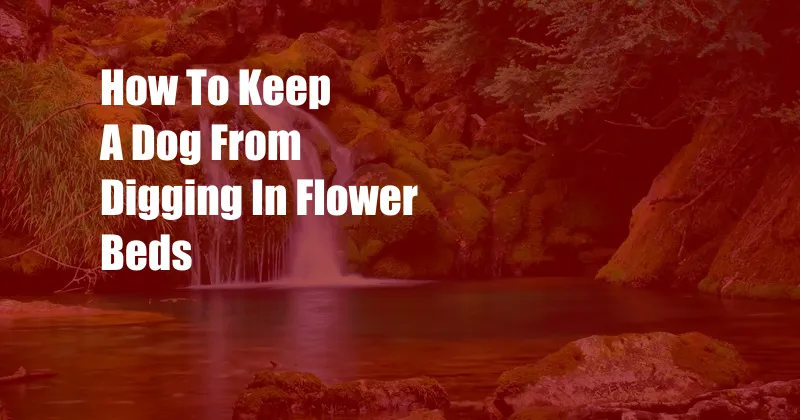
How to Stop Your Dog From Wreaking Havoc in Your Flower Beds
If your furry friend has a penchant for digging up your beloved flower beds, leaving you with a muddy mess and ruined blooms, don’t fret. This tenacious habit, though frustrating, can be curbed with a combination of patience, training, and strategic prevention.
Understanding Canine Excavation
Canine excavation is an ingrained instinct in our dogs. In their natural habitat, they would dig for shelter, cache food, and hunt small prey. While this behavior may not be desirable in our manicured gardens, it’s important to remember that it’s a natural part of their biology.
The Five Ws of Dog Digging
- Why? Primary instincts, boredom, escape, or anxiety.
- Who? Puppies and young dogs are most prone to dig.
- What? Flower beds, loose soil, and buried objects.
- When? Anytime, but often when bored or left unsupervised.
- Where? Typically in cool, shady areas.
Preventing and Curbing Canine Excavation
1. Provide Ample Exercise and Stimulation: A tired dog is less likely to seek entertainment in the garden. Engage in regular play sessions, walks, and training to keep their energy levels down and their minds active.
2. Create Designated Digging Areas: Allocate a specific area in your yard where digging is permitted. Fill it with loose soil and bury toys or treats to encourage use. This provides an outlet for their natural instinct and keeps them from targeting your flower beds.
3. Use Fencing and Barriers: Prevent access to flower beds by installing physical barriers such as fences, chicken wire, or thorny plants. This discourages digging attempts and protects your precious blooms.
4. Repellents and Deterrents: Certain scents and substances can deter dogs from digging. Sprinkle cayenne pepper, citrus peels, or vinegar around the flower beds. You can also try motion-activated sprinklers or ultrasonic devices.
5. Training and Rewards: Teach your dog the command “leave it” and reward them when they comply. If they start digging in the flower beds, firmly say “leave it” and redirect them to the designated digging area. Positive reinforcement is key.
Expert Tips for Dog Owners
“Regular exercise and socialization are crucial for preventing boredom and digging behavior,” advises certified dog trainer Amelia Rose. “Providing your dog with an enriching environment with plenty of toys and mental stimulation can also help curb their digging desires.”
Veterinarian Dr. Mark Spencer adds, “If your dog exhibits excessive digging, consider underlying medical conditions or anxiety issues. Consulting with a veterinarian can help rule out any health concerns and provide tailored solutions.”
FAQs on Canine Excavation
Q: Why does my dog dig only at night?
A: Dogs may dig at night because of nocturnal instincts or to escape boredom or loneliness.
Q: How can I stop my dog from digging under the fence?
A: Install an underground fence, dig a trench and fill it with gravel or rocks, or use anti-digging spray.
Q: What happens if I punish my dog for digging?
A: Punishment can damage your bond with your dog and lead to fear or aggression. Positive reinforcement and preventive measures are more effective.
Conclusion
Curbing your dog’s digging behavior requires a holistic approach that addresses both their instincts and environmental factors. By providing ample exercise, training, and strategic prevention, you can deter your furry companion from becoming a garden menace. Embrace their natural digging tendencies by creating designated areas and using deterrents where necessary. And remember, a well-behaved dog and a pristine flower bed can coexist harmoniously with a little patience and understanding.
Are you struggling with your dog’s digging habit? Share your experiences and ask any questions you have in the comments below. Together, we can help your furry friend become the perfect garden companion.